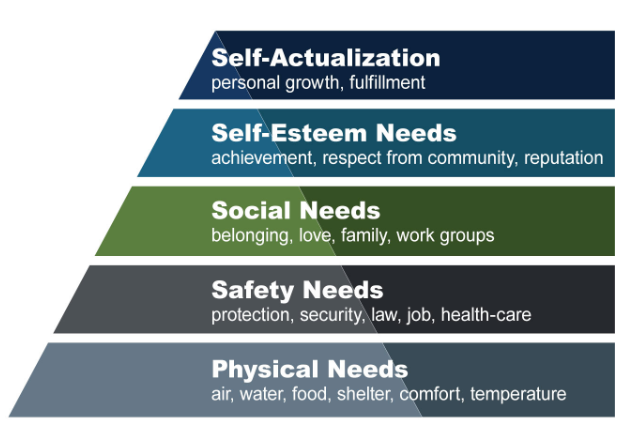The 5 Verses You Need To Know To Be Happy
Anyone who believes that God is either ignoring or punishing them—or that Satan is relentlessly tempting them—is like someone who is lost. Lost not just in direction, but in identity. They don’t know where they came from, where they’re going, or even how they got here. They’re confused.
You’ve seen people like this—stuck, unable to move forward or go back. And when asked why they remain stagnant, rather than humbly admitting they don’t know, they point fingers. They blame others. They blame circumstances. They blame everything but themselves.
This is what it means to be spiritually lost. And all we hear from such souls are blames and excuses.
But stay with me, because I want to show you something powerful. I’ll share five verses that you need to hear—verses that can shift your entire perspective and lead you toward the happiness you were promised.
The truth is, life offers only two paths. Just two.
Either you remember who God is, return to His ways, and begin to think and act in the goodness that reflects your divine heritage—
Or you rebel. You run, knowingly or unknowingly, toward darkness, aligning yourself with pain, destruction, and the one who delights in it: Satan.
There is no neutral ground.
But I’ll show you the difference—clearly. You will redefine who God is to you. You will remember what you've always known in your heart—what has been passed down through generations.
Maybe now is the time to wake up. Maybe you’ve finally had enough of the life you’ve been living. Maybe—just maybe—you’re ready.
Know the definition of God. Answer His ever-present call. And be happy—truly happy.
Knowing The Fake You or Ego
Whenever we speak negatively about ourselves, complain about life, or blame God, it isn’t our true self speaking. It’s the voice of the ego—the false self. This is what Jesus often referred to when He spoke of "men," not in terms of gender, but as the human tendency to live disconnected from the divine.
Because the real you doesn’t complain. The real you has been with God from the very beginning—from conception, through childhood, and into adulthood. That true self knows peace, purpose, and love.

Let’s take a moment to define God using five powerful verses—and start by revisiting this truth:
Matthew 19:14 – But Jesus said, “Let the little children come to Me, and do not forbid them; for of such is the kingdom of heaven.”
Jesus wasn’t just saying children are welcome in the Kingdom—He was saying they are the Kingdom. They are expressions of God.
Now, that might raise questions. If you're a parent, you've probably heard (or maybe said) things like, "Kids can be so sneaky, or dishonest, or even cruel." So how can they be godly?
But think about it. Aren’t these the same children you proudly call “angels” when you talk about them to others? Can they be both divine and deceitful? Who are they, really?
To answer that, we must look deeper.
Children are like God not because they’re perfect in behavior, but because they are still closely connected to their Source. They haven't yet been fully shaped by ego, by fear, or by the broken systems of this world. Their innocence, their curiosity, their joy—these are glimpses of the divine.
You might wonder, "Isn’t lying a sign of ego?"
I’d say—honestly—they’re just modeling you. They trust you. They learn by watching.
Surely, you’ve noticed: the younger a child is, the more pure and whole they seem. As they grow, they begin to adopt the flaws of the world—judgment, shame, prejudice, pride. Not because their true self changes, but because their developing mind absorbs what it sees.
And what does it see? Us. The world.
Who is “the world”? That’s a question worth answering.
But remember this: when children are free of judgment, when we stop projecting adult expectations onto them, don’t they make us incredibly happy? Doesn’t their laughter remind us of something sacred?
So no—I’m not saying children become flawed in their essence.
I’m saying they learn those flaws from the world.
Their true self remains untouched. So does yours.
It’s time to remember who we really are. And maybe, just maybe, the children have been showing us the way all along.
Matthew 19:21 – Jesus said to him, “If you want to be perfect, go, sell what you have and give to the poor, and you will have treasure in heaven; and come, follow Me.”
You are being called—first as a child, now again as an adult—to return to your original, unburdened self.
Perhaps you’ve been told that only a chosen few will enter the Kingdom of God. That some are selected, and others are simply not meant to make it. But this teaching is false.
Show me any verse in Scripture where someone keeps God’s commandments, surrenders the ego they’ve learned from the world, and is still denied happiness or eternity. There is none.
This moment in Matthew 19 is a response to that very thinking. Some say, “Well, the twelve disciples were specially selected.” But did Jesus ever forbid anyone else from following Him? Never. The invitation was—and still is—open to all.
Others say that perfection is impossible because of “original sin.” But we’ve already addressed that in our earlier discussion on why suffering exists. Unless you’re suggesting that Jesus didn’t know what He was talking about, then yes, you can be perfect.
Start by affirming it.
Say it out loud: I can be perfect.
Yes, it sounds bold when viewed through the lens of ego. But that’s not how God sees you. To cement that part of the definition of God, Matthew 5:48 said – “Be perfect, therefore, as your heavenly Father is perfect.”
Now listen to that voice in your head that insists you can’t… and respond to it with: Yes, I can.
Let’s also clear up another common misunderstanding of Matthew 19:21. Many read this verse and assume Jesus is commanding poverty. But that misses the heart of His message.
Why? First—there is no poverty in God.
Second—the instruction to “sell what you have and give to the poor” is not literal for all. It’s a parable, a metaphor. It represents detachment and the joy of selfless giving.
Most people have never truly experienced the joy of giving simply because they’ve never tried it without expectation. But think for a moment—how do you feel when someone expresses deep, heartfelt gratitude for something you did, especially when you had no obligation to help?
If that hasn’t happened to you yet, try it.
Go out into your community.
Do something—purely from your heart—that surprises and uplifts someone in need.
Then come back and tell me whether or not you felt the presence of God in that moment.
Because in such acts, you are defining God. And what flows from that is joy, peace, and deep happiness.
Our attachments—to things, status, security—blur our spiritual focus. Most of us haven’t learned the difference between needs and wants. Psychologist Abraham Maslow outlined this in the 1940s, but the principle runs much deeper spiritually. As you grow, your awareness shifts—from survival and fear, toward purpose, fulfillment, and divine connection.

What the world calls “self-actualization,” the spiritual path calls “awakening.”
It’s about returning to who you’ve always been—beneath the layers.
A self-actualized person freely gives up what they don’t need. They let go with ease.
Does that make them poor?
Not at all.
You may ask, “How does that even work?”
Well… it’s a mystery.
You’re asking to see the harvest before you’ve planted the seed.
And so, at this stage of your growth, all I can tell you is this:
It’s a miracle.
And it’s waiting for you.
Matthew 19:26 – But Jesus looked at them and said, “With men this is impossible, but with God all things are possible.”
When Jesus says, “With men,” He’s not dividing people into categories like “ordinary” and “chosen.” He’s referring to those who are still deeply entangled in the ambitions of the world—those stuck in the lower levels of awareness, focused only on survival, security, and control.
But those who are spiritually awake—those who have moved into higher awareness—know something deeper:
Not only is it possible to let go, detach, and live freely… it’s necessary for true happiness.
And let’s be honest—letting go is challenging at every level of life.
- For a child, it’s hard to part with a favorite toy—even if it seems insignificant to an adult.
- For a fisherman, giving up his canoe is no small ask—even if it means little to someone wealthy.
- And for the wealthy? Letting go can be just as difficult—if not harder.
It’s not about how much something is worth in dollars.
It’s about how deeply we’ve attached our identity to it.
There are people driving cars with no market value—yet those cars hold immeasurable meaning to them. The challenge of detachment isn’t about throwing things away or becoming poor. It’s about something far more profound:
It’s about recognizing the difference between what matters—and what doesn’t.
It’s about freeing your mind from the control that possessions and achievements try to exert over your choices.
So hear this clearly:
Don’t let your stuff—your money, your status, your accomplishments—pull you away from kindness.
Don’t let fear of loss guide your decisions.
And never, ever hurt someone just to keep what you have.
Because fear-based decisions do not lead to happiness. Not for the person you hurt—and not for you, either.
True joy comes not from clinging, but from trusting.
Not from control, but from surrender.

Revelation 3:20 (NKJV)
“Behold, I stand at the door and knock. If anyone hears My voice and opens the door, I will come in to him and dine with him, and he with Me.”
There are moments in Scripture that speak directly to the human heart—and this is one of them. Revelation 3:20 isn't just a historical message to the church in Laodicea. It’s a message for you and me—right now.
This verse is written in the present tense. Why? Because God is present. He was, He is, and He is to come.
The Lord says, “I stand at the door and knock.” Not “I once stood,” or “I will stand,” but I stand—now.
So then we ask: What door is He knocking on? Is it your house? Your workplace? No. It’s the door of your heart. The door of your will. That place where decisions are made.
Think about it: How do you decide what to believe, what to value, or how to respond to others? That power of decision is your free will. And God is standing right there—at the threshold—inviting you to let Him in.
The verse says, “If anyone hears My voice and opens the door…” That means two things are required: hearing and responding.
Many of us hear. We hear that still, small voice nudging us to be kind, to give, to grow, to forgive. But hearing alone isn’t enough. We have to open the door.
Some say, “I’ve never heard God’s voice.” But let me ask: Have you ever heard that whisper in your heart urging you to do good? To help someone in need? To follow through on something that would make life better—for you or someone else?
That was the voice of God. And still, many of us choose not to open.
Often, right after hearing God's prompting, another voice follows—offering excuses, distractions, or empty rewards for saying no.
And let’s be honest, those rewards never satisfy. They might promise relief, but they don’t bring peace. They might feel good for a moment, but they never fill the heart.
God’s voice calls us to what is good, eternal, and life-giving. But we must choose to follow it. We must choose to open the door.
This verse ends with a promise: “I will come in and dine with him, and he with Me.” That’s not a distant, mechanical transaction. That's a relationship. That’s intimacy. That’s home.
You are a child of God. You were chosen before your conception, and you are still being called today.
Will you answer?
There is no place like home.
Lord, thank You for knocking on the doors of our hearts. You are helping us to not only hear Your voice but to open the door and welcome You in. When we do, we feel Your presence and to follow the goodness You call us to. Let us dine with You, walk with You, and live in Your eternal presence. Amen.
Deuteronomy 28:47 (NKJV)
"Because you did not serve the Lord your God with joy and gladness of heart, for the abundance of everything..."
This is not a verse you often see on a coffee mug or church banner. It’s not the kind of Scripture that gives warm, fuzzy feelings at first glance.
But sometimes, truth needs to confront before it can comfort.
This verse reminds us of something we often forget: it’s not enough to just serve God. How we serve Him matters. Our posture, our heart, and our attitude all count in God’s eyes.
Let me be honest—I’m not here to scare you. Verse 47 might feel heavy, but it’s meant to be sobering, not condemning. It appears near the end of a long list of blessings and curses in Deuteronomy 28.
This specific verse serves as a pivot point—a warning about serving God without joy and without gladness of heart, despite the abundance He has already provided.
Think about that: "Because you did not serve... for the abundance of everything."
They weren’t lacking. They weren’t in crisis. They had everything, yet lacked joy and gratitude. This marks a lack of appreciation. Anyone who does not appreciate cannot feel good regardless of how much you offer. It’s the choice to depreciate or appreciate.
Serving God with joy isn’t optional—it’s essential. God is not just after our actions. He wants our hearts. He wants children who are not just obedient but glad to be in relationship with Him.
Why? Because joy in service proves we can define God and what He’s done for us. It means we see the abundance—not just material, but spiritual: salvation, grace, mercy, daily breath, and eternal hope.
If you're feeling convicted it’s the consequence not the punishment from God. Verse 48 says:
"Therefore you shall serve your enemies... in hunger, in thirst, in nakedness, and in need of everything..."
It’s a hard truth. When we reject joy in serving God, we often find ourselves serving other things that do not love us—our jobs, our ego, our addictions, our fears. When we withhold gladness from the One who provides, we often lose sight of the provision altogether.
Here’s where we shift from fear to freedom.
You might be thinking, "But I’m unhappy. I feel disconnected. Is this God's fault? Is it the devil?"
Let’s be clear: Your unhappiness is not God’s doing. And often, it’s not even the devil’s fault. As uncomfortable as it sounds, we make choices that separate us from joy. Sometimes we look for scapegoats when the real issue is within.
Romans 2:11 reminds us: “God does not show favoritism.”
He is impartial. He is steady. He is good to all. That means the doors to joy, purpose, and gladness are wide open to you—right now.
Here’s the good news: joy is not something you earn; it’s something you choose.
When you serve the Lord, do it with joy and gladness—not from guilt, fear, or routine. Serve because He has already given you everything: grace, forgiveness, life, purpose, and Himself.
And if you’ve been missing that joy—God isn’t far. He’s not holding back. The invitation is still open.
So let me ask you:
- Are you serving the Lord out of obligation or with joy?
- Have you let fear or excuses drain your gladness?
- Are you blaming others—or even God—for a joyless life that He never designed for you?
It’s time to return to joyful service.
Because the truth is, God has given you everything.
Now serve Him with everything—joyfully.
Lord, forgive us for the times we served You without gladness. Thank You for the abundance You’ve given us—seen and unseen. This awareness is restoring the joy in our lives. You are teaching us to worship, obey, and serve You not just in action but with glad hearts. Let our lives reflect gratitude, not grumbling. Let us choose joy again. In Jesus' name, Amen.
And Now Knowing the Real You
We live in a world obsessed with knowing others—what they like, what they feel, what makes them tick. Especially in relationships, we pour energy into understanding the other person. And yet, very few of us take time to truly know ourselves.
But here’s the truth: You can’t understand others fully until you begin to understand yourself—and more importantly, the Spirit that is your true nature.
In disciplines like psychology, sociology, and anthropology, we are taught to divide the world into categories: you, the other person, personality types, culture, society. And while these can be helpful tools, they can also blind us to a deeper truth: we are not as separate as we think.

The farther you go—into metaphysics, quantum physics, and most importantly, spiritual truth—the more you begin to see: there is no fundamental separation between you and anyone or anything else.
We are all made of the same thing. Some call it intelligent energy. Scripture calls it Spirit.
Here’s an image to hold onto: Think of a single grain of quinoa. On its own, it seems weightless, almost insignificant. But collect enough of them and you have something substantial.
In the same way, your physical body, your thoughts, even the objects around you—what we call “solid”—are all condensed energy. Or in spiritual terms: manifestations of Spirit.
This is not just poetic; it’s profoundly biblical. Genesis 1:2 tells us the Spirit of God was present before anything had form. That same Spirit brought everything into being—including you.
You are not just flesh and blood. You are Spirit.
Here’s something fascinating: Energy and spirit share a key trait—they cannot be seen, touched, or heard by the senses. They are real, but imperceptible.
So what does that mean for you?
It means that who you truly are is not defined by what you look like, what culture you come from, or what personality type you’ve been labeled. You are more than any of those things.
You are Spirit. And Spirit is you.
Because Spirit is indivisible, there is no real separation between you, me, or anything else in this universe. As Paul wrote in Acts 17:28: “In Him we live and move and have our being.”
The illusion of separateness is what causes so much confusion, conflict, and isolation.
But when you realize that the same Divine Spirit flows through all things, you begin to live differently—more humbly, more connected, more free.
How do you experience this truth—not just believe it, but feel it? You must quiet the senses.
As we’ve shared in past teachings, you need moments where you step back from the noise, the distractions, the endless stream of sensory input. Meditation, stillness, solitude, prayer—these are not luxuries. They are lifelines.
When you still the senses, you begin to feel the presence of God within you. And once you feel that, everything changes.
This is not just knowledge to store up. It’s a call to practice.
Start small. Sit in silence. Listen to your breath. Let go of thoughts. Let Spirit reveal Itself.
Then come back—and share. Tell others what you experienced. Not just to inform them, but to inspire them. Your story could awaken someone else's journey.

So I ask you today:
- Are you ready to know the real you?
- Are you ready to stop defining God from a distance, and start feeling God within?
- Are you willing to quiet the noise, even for a few minutes a day, to reconnect with the Spirit that you are?
You were created by Spirit. You are Spirit. And God is waiting for you to wake up to that truth.
Now go and practice! And when you do—come back and tell us what you found.
Father, thank You for revealing that we are not just bodies, but Spirit. We are going to go within, and to remember who we are in You. We are going to live what we’ve learned. And may our experience with You overflow into the lives of others. In the name of the original Spirit—Ame


Thank you for your sharing. I am worried that I lack creative ideas. It is your article that makes me full of hope. Thank you. But, I have a question, can you help me?